Issue 84 : 27 June 2021
Talofa Lava, Kia Orana, Malo E Leilei, Tena Koutou, Hello ...
... and welcome to the latest issue of “For The Love Of The Game”, the official e-zine of the New Zealand Amateur Sport Association Inc.
If you have any feedback on this issue, ideas for future articles, or would like to contact the Editor, please click here. And, you are invited to forward the e-zine to others you know, who may be interested in reading it. An archive of earlier editions of the e-zine can be found here. For those who follow Twitter, you can also follow the Association, @AmateurSportNZ.
If you are interested in applying for membership of the Association, please click here.
Association To Appear At Parliamentary Select Committee ...
Following the lodgement of its submission on the Incorporated Societies Bill last month, the Association has been invited to meet and present to the "Economic Development, Science and Innovation" Select Committee in the select committee rooms at Parliament, Wellington, on Thursday, 8 July. (The Committee is due to report its findings to Parliament by 6 October 2021).
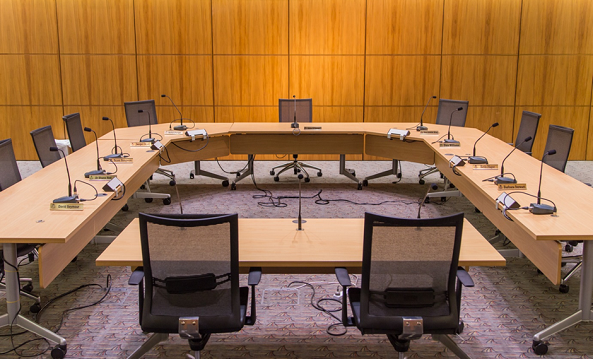
The Select Committee has also invited the Association to provide additional submissions, if any, on the day. The Association therefore invites any further feedback from members or supporters on any aspect of the submission, or more generally on how the reform will affect community sport organisations. Please send any comments or feedback to office@asa.org.nz.
But, Is It The Right Select Committee? ...
While pleased to have been invited to appear at Parliament, the Association suggests that the Incorporated Societies Bill may be under the review of the wrong select committee. By way of explanation, the "Social Services & Community" Select Committee considers legislative business related to: social development; children, young people and seniors; Pacific peoples and ethnic communities; arts, culture and heritage; sport and recreation; and the voluntary sector. These areas are representative of the majority of incorporated societies.
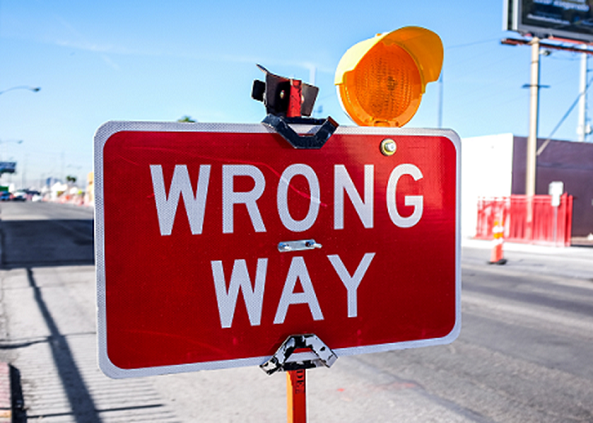
By way of contrast, the "Economic Development, Science and Innovation" Select Committee has the responsibility to consider legislation relating to: business development, tourism, Crown minerals, commerce, consumer protection and trading standards, research, science, innovation, intellectual property, broadcasting, communications, and information technology. None of these areas appear to have a direct relationship to the core constituents of incorporated societies.

The Association suggests that this exposes a fundamental flaw in the current legislative reform process (and the focus of parliamentary members when considering the Bill). Based on the Association's national database of sport clubs, around one-third of incorporated societies are directly involved in sport and recreation, with social development, culture, arts and the voluntary sector widely represented across all other incorporated societies. In this regard, incorporated societies are critical for "social well-being" rather than "economic development".
Viewpoint : “Law Of Unintended Consequences” To Reduce Volunteers ...
As many winter-sport codes struggle to attract and retain volunteers to deliver sport to local communities, it’s timely to reflect on what motivates people to support amateur sport as a volunteer match official, administrator or coach, particularly in light of current legislative reform.
A 2012 study found four main groups of amateur sport volunteers: “students” looking for experience and personal development (CV enhancement) opportunities (predominantly male); “sport lovers” who having become older, can no longer compete through injury or have reached an advanced level of expertise in their sport; “active parents” who are already on the side-lines and may volunteer when their club expresses a need; and “skilled volunteers” responding to a specific club need, motivated by a desire to give something back to the community.
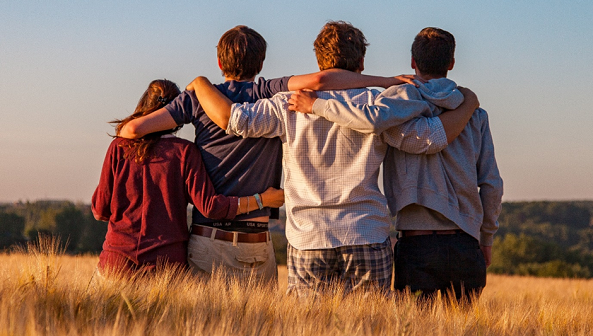
The research also revealed that the principal factors acting as barriers to the engagement and long-term participation of these groups as volunteers are: a lack of time; training needs not being met (or being too costly); a lack of support for sport clubs from other organisations; a “poor social environment” (e.g side-line abuse of match officials); too few volunteers to help out; anti-social hours (e.g. swimming training); legislative obligations and family commitments.
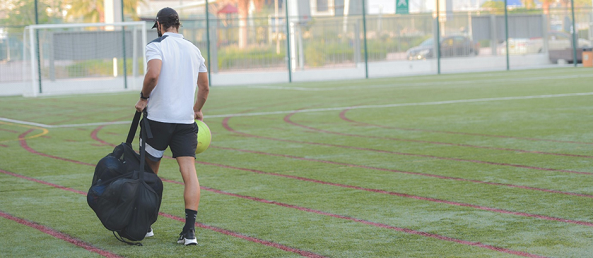
In summary, when it all becomes “too hard” for sporting codes and clubs to successfully recruit and retain volunteers, they are most likely to cite one of (or a combination of) the above as explanatory factors. This Association believes the legislative reform being imposed on incorporated sport clubs (which when passed later this year) will likely increase these barriers and reduce volunteer participation, creating a “law of unintended consequences”.
2021 National Sport Club Survey (NSCS) Launch Date Confirmed ...
Key dates for the 2021 NSCS have now been confirmed, with this year’s survey scheduled to commence on Thursday, 19 August. Survey insights and regional workshops (venues to be confirmed), are planned for September and October.
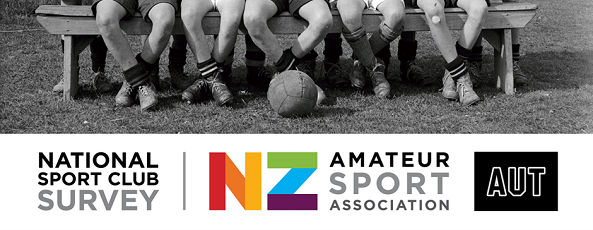
NSCS insights are made generally available to respondents and the wider public following each survey period, principally through media releases (traditional and social) and regional workshops. In 2021, the Project Team is keen to invite National Sport Organisations (for the first time) to learn more about how survey aspects relate to their sport, (and how they compare relative to other codes). Please contact office@asa.org.nz for more details.
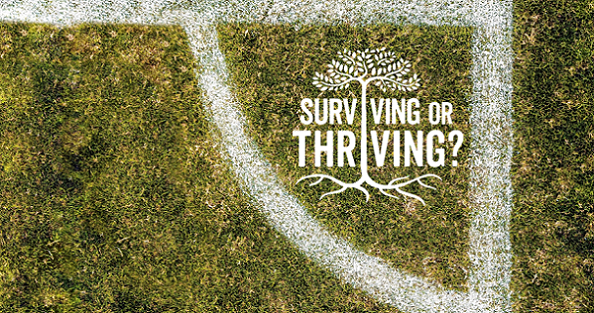
Further information concerning the survey, including a full schedule of key dates and workshop opportunities will be sent to the Association’s national database of sport clubs in late July.
“Gentle Giant” – The Jubilee All Blacks ...
A new book by rugby historian Russell King, tells the story of his father Ron, who left Hokitika in August 1935, on a five-month adventure that took him and his All Black team mates to the other side of the world to play a total of 29 games. As Russell explains, at a time when rugby union was particularly strong in the ‘Home Countries’, the story outlines the challenges the team faced on the field while touring the United Kingdom and Canada, as well as the expectations placed upon them as representatives of their country.
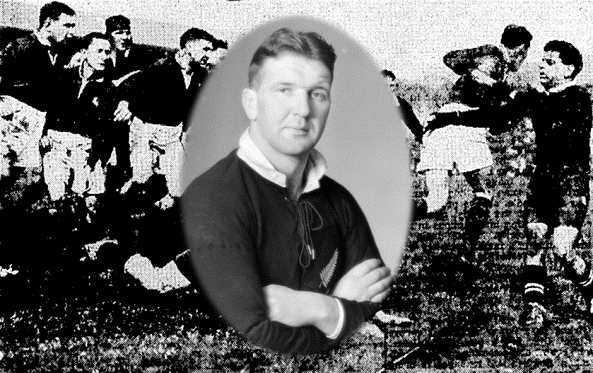
(Ronald Russell King, who captained the All Blacks against the Springboks in 1937)
In their ambassadorial role, the players were expected to showcase how “New Zealand produces first class soldiers, first class footballers, and good fellows generally, as well as the best butter, excellent cheese, good mutton and the very best lamb”. Gentle Giant is as much about the All Blacks’ social programme as it is about the games the team played. It highlights a time when, with poor radio and no television, print media was paramount, and rugby writers set the scene for the rugby-following public. You can find out more about the book and order an advance copy, by visiting www.gentlegiant.nz.
Dynasty Sport Confirmed As Survey Key Sponsor ...
The Association and AUT are delighted that Dynasty Sport Limited has confirmed its financial support for the National Sport Club Survey in 2021. Dynasty Director Jamal Thompson says he is "looking forward to continuing Dynasty’s research collaboration with the Association and AUT and learning more about the challenges, issues and opportunities being faced and managed by sport clubs, through the outcomes of this year’s survey."
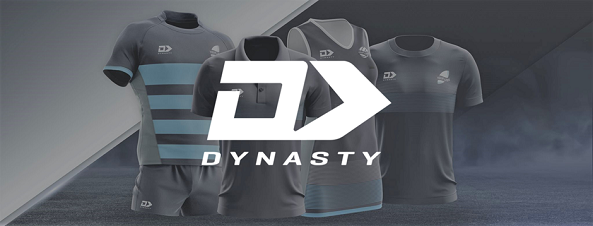
In 2021, the Association also welcomes Forsyth Barr Limited as a new survey sponsor. Forsyth Barr recognises that sport clubs provide physical, mental and social well-being, which complements the financial well-being the firm creates for New Zealanders.
From The Archives ...
PUTARURU PRESS, VOLUME XI, ISSUE 545, 2 NOVEMBER 1933, PAGE 1
AN ALL ROUND SPORTSMAN
“To have been an active member of a cricket club for 25 years is a record which few can boast, yet it is that of Mr. W. W. (“Billy”) Livingstone, president of the Matamata club, who only retired from active participation in the game this year, and then only under medical orders. Billy commenced his cricket career some 42 years ago with Tuhikaramea, when youngsters were keen enough on the game to ride 25 miles bareback on horses. The team was captained by Fred Lang (now Sir Frederick), and included six brothers Livingstone, Stewart Reid (present MP for Raglan) and his brother, Walter Reid.
Cricket, however, is not the only sport which has claimed his enthusiastic attention. Besides representing Waikato at cricket and rugby, deerstalking, fishing and big game shooting have all been indulged in, and he has learned all there is to know about these sports.
In Africa, while chasing big game, Billy nearly had his “light put out”, as he termed it on one occasion when he was prevailed upon to speak of the incident. It happened beyond Tanganyika. An injured lion suddenly came out of the long grass about 15 yards away and behind his party. Billy’s first shot missed as the animal sprang towards him. Keeping cool he took more careful aim with the next and shot the lion dead as it crouched to spring some seven or eight yards off. “Once in a life-time is quite sufficient for such an experience,” said Billy, and with this view most sportsmen will agree.”
William Williamson (“Billy”) Livingstone was born in 1874, the son William Williamson and Emma Selina Livingstone and the eldest of eight children. Billy’s father was a Banks Peninsula dairy farmer, who (when Billy was four years of age) moved the family to the Waikato and settled at Te Rore, later moving to the Tuhikaramea district.
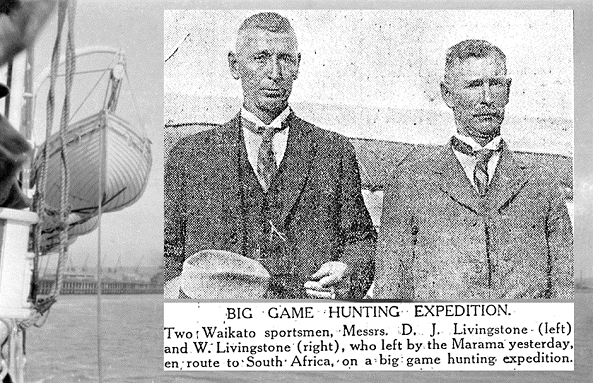
Following his marriage to Grace McMiken in 1907, Billy moved to the Matamata district, purchasing a farm on Tower Road. He resided there for the remainder of his life taking an active interest in sport. As a young man he was a good all-round athlete, being an especially keen cricketer and he was an active member of the Matamata Cricket Club, being President until shortly before his death. He was at one time a Waipa representative footballer (in the early 1900’s) and was later to help establish the soccer game in the region, also becoming a Trustee of Bedford Park, which was to become the home ground for Matamata rugby and cricket.
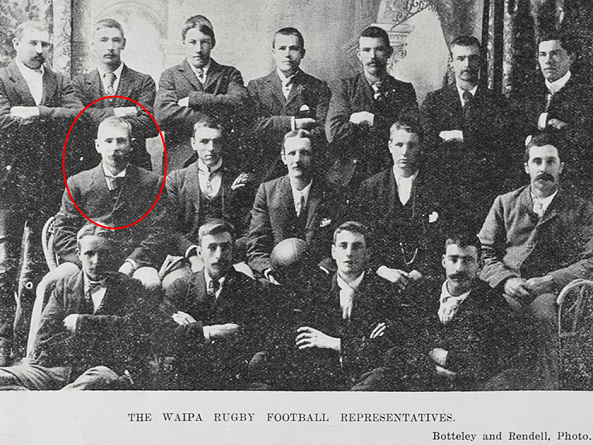
(Billy Livingstone, circled, with the Waipa rugby representatives of 1900)
All through his life he was a keen devotee of "the gun, rifle and fishing rod", and was a noted deer stalker. As noted above, in company with his brother, David, in 1926 he went on a big-game hunt to Central Africa, following the trail blazed by his more famous namesake explorer. Over their nine-month tour of Africa, they were reported to have bagged “three lions, four elephants, four rhinoceroses and three hippopotami.”
At the time of his death in 1934 at the age of 60, Billy was in Tauranga on holiday and was reported to have been “playing a sword fish” off Mayor Island when, "apparently the excitement proved too great, for, before any strain was on the line, he complained of great pain in his side and asked to be relieved of his rod. On being unbuckled from the chair he rolled over and passed away - a fitting end to such a sportsman’s life."
The Final Word ...
“I would much rather have come tenth and be judged against everyone than come first and be judged against just a few.”
(Daley Thompson, CBE, former British decathlete)